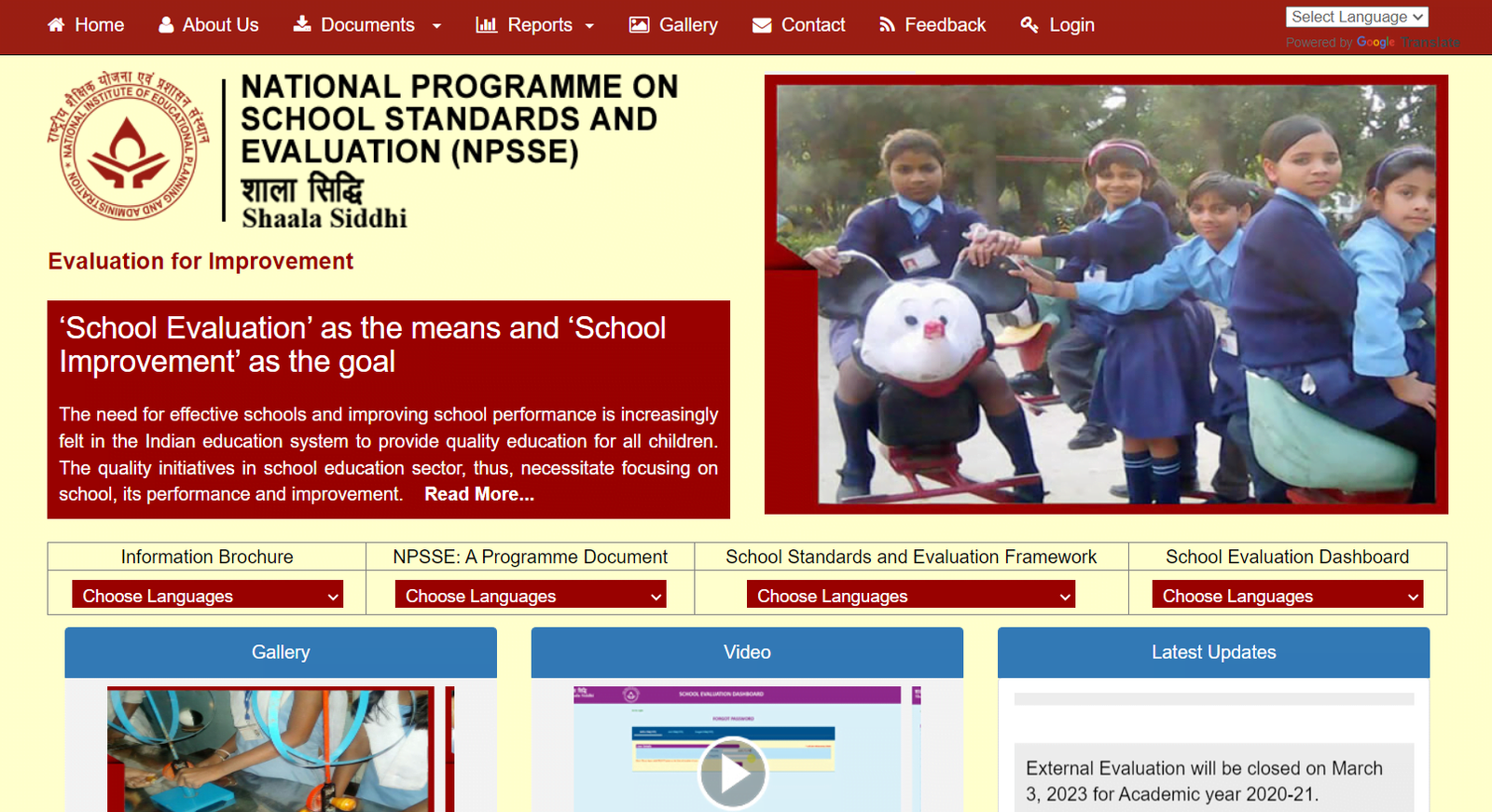About Shaala Siddhi – School Evaluation Dashboard e-Samiksha?
“Shaala Siddhi” is a school self-evaluation program initiated in India to assess and improve the quality of school education. It was developed by the National Institute of Educational Planning and Administration (NIEPA) under the guidance of the Ministry of Education, Government of India.
The main objective of Shaala Siddhi is to provide a structured and comprehensive framework for schools to evaluate their performance and identify areas for improvement. This program aims to enhance the quality of education by promoting self-assessment and continuous improvement in schools. It provides a systematic way for schools to reflect on their strengths and weaknesses, set goals, and work towards achieving them.
Shaala Siddhi involves a set of key components, standards, and indicators that schools use to assess various aspects of their functioning, including teaching and learning processes, infrastructure, governance, community participation, and more. The self-evaluation process encourages the active involvement of teachers, students, parents, and other stakeholders in assessing and enhancing the school’s performance.
What is the National Programme On School Standards And Evaluation (NPSSE)
Vision of NPSSE
The primary objectives of ShaalaSiddhi are as follows:
- Enhancing School Quality: The primary goal of Shaala Siddhi is to enhance the quality of education in schools across India. It provides a structured framework for schools to assess their strengths and weaknesses and work towards improving their overall performance.
- Promoting Self-Assessment: Shaala Siddhi encourages schools to engage in self-assessment. This means that schools themselves evaluate their functioning, which can lead to a better understanding of their specific needs and areas for improvement.
- Empowering School Stakeholders: The initiative empowers various stakeholders, including teachers, students, parents, and the school management, by involving them in the evaluation process. This active participation fosters a sense of ownership and responsibility for school improvement.
- Data-Driven Decision Making: Shaala Siddhi promotes data-driven decision making in schools. By collecting and analyzing data related to school performance, educators can make informed decisions to enhance teaching and learning processes.
- Setting and Achieving Goals: The initiative encourages schools to set specific goals for improvement and work systematically to achieve those goals. This goal-oriented approach is intended to drive continuous progress.
- Quality Assurance: Shaala Siddhi serves as a quality assurance mechanism in the education system. By assessing various aspects of school functioning, it helps ensure that schools meet prescribed standards and guidelines.
- Accountability: It fosters a culture of accountability in schools. By making self-evaluation a regular practice, schools can hold themselves accountable for their performance and the outcomes of their students.
- Community Engagement: The initiative aims to enhance the engagement of the local community, including parents and guardians, in the school’s educational activities and decision-making processes.
- Capacity Building: Shaala Siddhi provides opportunities for capacity building among educators, helping them improve their skills and knowledge to deliver quality education.
- Alignment with National Education Goals: It aligns with the broader national education goals and policies, ensuring that schools contribute to achieving these objectives.
About Web Portal for National Programme On School Standards And Evaluation (NPSSE)
The National Programme on School Standards and Evaluation (NPSSE) is supported by a dedicated and interactive web portal. The web portal has all programme related documents which can be downloaded by all the users. The web portal has an interactive platform wherein each school can submit its self-evaluation report online. The external evaluators have to use the same web portal to provide their evaluation report. A consolidated school evaluation report is generated online encompassing both self and external school evaluation report.
Each school can create its login ID by using UDISE code as login ID and can generate their password. Similarly blocks, districts and states can create their login ID and password. The web portal has a most unique feature in that it has access to school evaluation report of any school by the parents and public to observe and provide feedback.
How to Use Web Portal shaala Siddhi ?
https://shaalasiddhi.niepa.ac.in/shaalasiddhi/Account/ShaalaSiddhiLogin
- School :
- Creates its login ID by using UDISE code as login ID and can generate their password
- Feeds school self evaluation data and action for school improvement online https://shaalasiddhi.niepa.ac.in/shaalasiddhi/Reports/SchoolEvaluationReportForPublic?AcademicYearId=0
- Final submission of self evaluation data generates school self-evaluation report
- External evaluators :
- Create login ID and password for the respective school
- Access school self-evaluation report of the respective school
- Feed school external evaluation data and generate external evaluation report
- Consolidated school evaluation report
- generate online school evaluation report encompassing both self and external evaluation
- Block, District, State and National
- Create login ID and password for the block, district, state and national level
- Access evaluation report of each school, monitor the process and progress at the block and district level
- Generate summary of the school performance evaluation and analyze the levels in the respective domains and core standards at the block, district, state and national level
What Is the School Standards and Evaluation Framework
The School Standards and Evaluation Framework (SSEF) is a structured framework used in the context of school education to assess and improve the quality and performance of schools. It provides a set of standards, indicators, and guidelines that help schools, educators, and educational authorities evaluate various aspects of school functioning and education quality. The framework is often used in self-assessment and external evaluation processes to measure a school’s effectiveness and to identify areas for improvement. The specific components and standards within SSEF can vary from one educational system to another, but they generally encompass the following areas:
- Teaching and Learning: This category assesses the effectiveness of teaching methods, curriculum, classroom management, and the quality of teaching materials.
- Infrastructure and Resources: It examines the school’s physical facilities, including classrooms, libraries, laboratories, and the availability of teaching aids and resources.
- Governance and Leadership: This standard evaluates the management and leadership within the school, including administrative processes, decision-making, and the effectiveness of school management.
- Student Development: It focuses on the overall development and well-being of students, including their academic progress, extracurricular activities, and support for their social and emotional growth.
- Community Engagement: This standard assesses the school’s interaction and involvement with the local community, including parents, guardians, and the wider community in the educational process.
- Assessment and Evaluation: It examines the school’s assessment methods, examination processes, and the use of assessment data to improve teaching and learning.
- Inclusivity and Diversity: This standard looks at the school’s commitment to providing an inclusive and diverse learning environment, ensuring that all students, regardless of their backgrounds or abilities, have equal access to education.
- Professional Development: This involves evaluating the opportunities provided for teachers and staff to enhance their professional skills and development.
The specific indicators and criteria within each of these categories may vary depending on the educational system and the goals of the evaluation. Schools use these standards and indicators to self-assess their performance and identify areas for improvement. External evaluators, such as educational authorities or accrediting bodies, may also use the SSEF to assess schools and provide feedback.
Ultimately, the School Standards and Evaluation Framework is a valuable tool to enhance the quality of education, support school improvement, and ensure that schools are meeting established educational standards and objectives.
For Any Help to shaala Siddhi:
Unit on School Standards and Evaluation
National Institute of Educational Planning and Administration
17-B, Sri Aurobindo Marg, New Delhi-110016 (INDIA)
P: 011-26544963, 011-26544965 (Monday to Friday – 9:30AM to 5:30PM)
F: 011-26853041, 26865180
W: www.niepa.ac.in

















